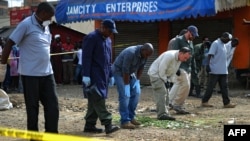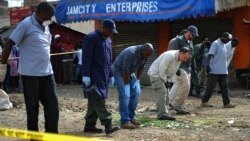The State Department has released its annual report on the state of terrorism worldwide, and says the terrorist threat continued to evolve rapidly in 2013.
While the core of al-Qaida has been degraded over the past several years, a more aggressive set of al-Qaida affiliates and like-minded groups have emerged, most notably in Yemen, Syria, Iraq, Northwest Africa, and Somalia.
A worrying trend, noted by the report, is that of foreign fighters traveling to Syria. Syria remains a major battleground for terrorism on both sides of the conflict, raising concerns that individuals who become foreign fighters in Syria will bring back violent extremist connections when they return home.
At the release of the report, U. S. Ambassador-at- Large and Coordinator for Counterterrorism Tina Kaidanow noted that al-Qaida and like-minded groups are not the only terrorist threats. “Iran’s state sponsorship of terrorism and Hezbollah’s activities are also of significant concern,” she said.
“Interdictions in the past year have found Iran attempting to smuggle arms and Iranian explosives to Syria, to Yemen and also to armed Shia opposition groups in Bahrain. And the IRGC Qods Force, Hezbollah and Iraqi Shia militant groups have all been providing a broad range of critical support to the Assad regime since the start of the conflict.”
Ambassador Kaidanow said that under the leadership of President Barack Obama, the United States has stressed the development of key counterterrorism partnerships across the globe, and has engaged in a variety of capacity-building efforts.
At the heart of those efforts are rule of law programs, where the U.S. seeks to help its partners use their law enforcement agencies to identify, prosecute, adjudicate and incarcerate suspected terrorists. The U.S. also works with partners to strengthen their ability to halt the financial flows of terrorist organizations, and to counter the messaging of terrorist groups in order to reduce the number of recruits.
“Evolving terrorist threats require…innovative strategies, creative diplomacy and even stronger partnerships,” said Ambassador Kaidanow. “Building partner capacity, countering violent extremism and engaging partners bilaterally and multilaterally are all essential…We’ve made significant progress, but there remains a lot to do.”
While the core of al-Qaida has been degraded over the past several years, a more aggressive set of al-Qaida affiliates and like-minded groups have emerged, most notably in Yemen, Syria, Iraq, Northwest Africa, and Somalia.
A worrying trend, noted by the report, is that of foreign fighters traveling to Syria. Syria remains a major battleground for terrorism on both sides of the conflict, raising concerns that individuals who become foreign fighters in Syria will bring back violent extremist connections when they return home.
At the release of the report, U. S. Ambassador-at- Large and Coordinator for Counterterrorism Tina Kaidanow noted that al-Qaida and like-minded groups are not the only terrorist threats. “Iran’s state sponsorship of terrorism and Hezbollah’s activities are also of significant concern,” she said.
“Interdictions in the past year have found Iran attempting to smuggle arms and Iranian explosives to Syria, to Yemen and also to armed Shia opposition groups in Bahrain. And the IRGC Qods Force, Hezbollah and Iraqi Shia militant groups have all been providing a broad range of critical support to the Assad regime since the start of the conflict.”
Ambassador Kaidanow said that under the leadership of President Barack Obama, the United States has stressed the development of key counterterrorism partnerships across the globe, and has engaged in a variety of capacity-building efforts.
At the heart of those efforts are rule of law programs, where the U.S. seeks to help its partners use their law enforcement agencies to identify, prosecute, adjudicate and incarcerate suspected terrorists. The U.S. also works with partners to strengthen their ability to halt the financial flows of terrorist organizations, and to counter the messaging of terrorist groups in order to reduce the number of recruits.
“Evolving terrorist threats require…innovative strategies, creative diplomacy and even stronger partnerships,” said Ambassador Kaidanow. “Building partner capacity, countering violent extremism and engaging partners bilaterally and multilaterally are all essential…We’ve made significant progress, but there remains a lot to do.”






